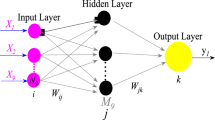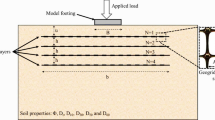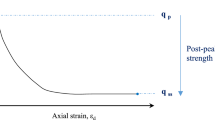Abstract
The soil water retention curve (SWRC) provides information for a wide range of geoenvironmental problems, such as analyses of transient two-phase flow, the bearing capacity and shear strength of unsaturated soils. Many past studies have shown experimentally the effects of stress on the SWRC. Unfortunately, direct stress-dependent water retention measurements are relatively time-consuming and generally require special equipment and a certain level of expertise. This study primarily aimed to develop a novel predictive framework within the context of soft computing to capture the dependency of the SWRC on several variables, with an emphasis on stress and soil type. To achieve this, the three shape parameters of van Genuchten’s water retention model were estimated using a comprehensive database of 102 SWRC tests retrieved from the literature. In this study, 60% of the datasets were employed for model training, with an additional 20% being designated for validation, while the remaining 20% were set aside for testing the model's performance. The data were analyzed using two machine learning techniques: the group method of data handling and multi-layer perceptron approaches. Results showed excellent performance of the two methods. A sensitivity analysis was conducted to explore the relative significance of the different variables. Interestingly, net stress was found to be almost as significant as soil type. The introduced artificial intelligence based predictive framework provided a very effective method of integrating theory and practice.

















Similar content being viewed by others
Data Availability
The authors declare that they have no known competing financial interests or personal relationships that could have appeared to influence the work reported in this paper.
References
Adeyemi O, Grove I, Peets S, Domun Y, Norton T (2018) Dynamic neural network modelling of soil moisture content for predictive irrigation scheduling. Sensors (switzerland) 18:3408. https://doi.org/10.3390/s18103408
Ahmadinezhad A, Jafarzadeh F, Sadeghi H (2019) Combination of water head control and axis translation techniques in new unsaturated cyclic simple shear tests. Soil Dyn Earthq Eng 126:105818. https://doi.org/10.1016/j.soildyn.2019.105818
Albadri WM, Noor MJM, Alhani IJ (2021) The relationship between the shear strength and water retention curve of unsaturated sand at different hydraulic phases. Acta Geotech 16:2821–2835. https://doi.org/10.1007/s11440-021-01189-7
Assouline S, Or D (2013) Conceptual and parametric representation of soil hydraulic properties: a review. Vadose Zo J. https://doi.org/10.2136/vzj2013.07.0121
Bayat H, Neyshaburi MR, Mohammadi K, Nariman-Zadeh N, Irannejad M, Gregory AS (2013) Combination of artificial neural networks and fractal theory to predict soil water retention curve. Comput Electron Agric 92:92–103. https://doi.org/10.1016/j.compag.2013.01.005
Bazargan A, Sadeghi H, Garcia-Mayoral R, McKay G (2015) An unsteady state retention model for fluid desorption from sorbents. J Colloid Interface Sci 450:127–134. https://doi.org/10.1016/j.jcis.2015.02.036
Behzadafshar K, Sarafraz ME, Hasanipanah M, Mojtahedi SFF, Tahir MM (2019) Proposing a new model to approximate the elasticity modulus of granite rock samples based on laboratory tests results. Bull Eng Geol Environ 78:1527–1536. https://doi.org/10.1007/s10064-017-1210-5
Biessmann F, Salinas D, Schelter S, Schmidt P, Lange D. (2018) Deep learning for missing value imputation in tables with non-numerical data. In: Int Conf Inf Knowl Manag Proc 2017–2026. https://doi.org/10.1145/3269206.3272005
Cai G, Liu Q, Li K, Zhang J, Liu Y, Zhou A (2023) Volume change behavior of compacted loess under drying/wetting and freezing/thawing cycles. Eng Geol. https://doi.org/10.1016/j.enggeo.2023.107329
Darzi AG, Sadeghi H, Zhou C (2023) A soil-brine retention model for wetting processes considering the hysteresis effects. Transp Geotech 41:101032. https://doi.org/10.1016/j.trgeo.2023.101032
Dias AS, Hughes PN, Toll DG (2023) Soil-water retention curve prediction for compacted london clay subjected to moisture cycles. Geotech Geol Eng. https://doi.org/10.1007/s10706-023-02706-z
dos Santos Pereira SA, Silva Junior AC, Mendes TA, Gitirana Junior GDFN, Alves RD (2023) prediction of soil-water characteristic curves in bimodal tropical soils using artificial neural networks. Geotech Geol Eng. https://doi.org/10.1007/s10706-023-02716-x
Eldin NN, Senouci AB (1994) Measurement and prediction of the strength of rubberized concrete. Cem Concr Compos 16:287–298. https://doi.org/10.1016/0958-9465(94)90041-8
Elkady TY, Al-Mahbashi AM, Al-Refeai TO (2015) Stress-dependent soil-water characteristic curves of lime-treated expansive clay. J Mater Civ Eng 27:04014127. https://doi.org/10.1061/(asce)mt.1943-5533.0000995
Fadillah IJ, Muchlisoh S (2019) Perbandingan metode hot-deck imputation dan metode knni dalam mengatasi missing values. Semin Nas off Stat 2019(1):275–285. https://doi.org/10.34123/semnasoffstat.v2019i1.101
Feng Y, Cui N, Hao W, Gao L, Gong D (2019) Estimation of soil temperature from meteorological data using different machine learning models. Geoderma 338:67–77. https://doi.org/10.1016/J.GEODERMA.2018.11.044
Garakani AA, Haeri SM, Khosravi A, Habibagahi G (2015) Hydro-mechanical behavior of undisturbed collapsible loessial soils under different stress state conditions. Eng Geol 195:28–41. https://doi.org/10.1016/j.enggeo.2015.05.026
Garakani AA, Birgani MM, Sadeghi H (2021) An effective stress-based parametric study on the seismic stability of unsaturated slopes with implications for preliminary microzonation. Bull Eng Geol Environ 80:7525–7549. https://doi.org/10.1007/s10064-021-02440-x
Geva S, Sitte J (1992) A constructive method for multivariate function approximation by multilayer perceptrons. IEEE Trans Neural Netw 3:621–624. https://doi.org/10.1109/72.143376
Guido G, Haghshenas SS, Haghshenas SS, Vitale A, Gallelli V, Astarita V (2020) Development of a binary classification model to assess safety in transportation systems using GMDH-type neural network algorithm. Sustain 12(17):6735. https://doi.org/10.3390/SU12176735
Haeri SM, Khosravi A, Garakani AA, Ghazizadeh S (2017) Effect of soil structure and disturbance on hydromechanical behavior of collapsible loessial soils. Int J Geomech 17:04016021. https://doi.org/10.1061/(asce)gm.1943-5622.0000656
Haeri SM, Garakani AA, Khosravi A, Meehan CL (2014a) Assessing the hydro-mechanical behavior of collapsible soils using a modified triaxial test device. Geotech Test J. https://doi.org/10.1520/GTJ20130034
Haeri SM, Khosravi A, Ghaizadeh S, Garakani AA, Meehan CL (2014b) Characterization of the effect of disturbance on the hydro-mechanical behavior of a highly collapsible loessial soil. In: Unsaturated soils: research and applications - proceedings of the 6th international conference on unsaturated soils, UNSAT 2014. pp 261–266. https://doi.org/10.1201/b17034-35
Haghverdi A, Cornelis WM, Ghahraman B (2012) A pseudo-continuous neural network approach for developing water retention pedotransfer functions with limited data. J Hydrol 442–443:46–54. https://doi.org/10.1016/j.jhydrol.2012.03.036
Hedayati-Azar A, Sadeghi H (2022) Semi-empirical modelling of hydraulic conductivity of clayey soils exposed to deionized and saline environments. J Contam Hydrol 249:104042. https://doi.org/10.1016/j.jconhyd.2022.104042
Hornik K, Stinchcombe M, White H (1989) Multilayer feedforward networks are universal approximators. Neural Netw 2:359–366. https://doi.org/10.1016/0893-6080(89)90020-8
Hosseini SAA, Mojtahedi SFF, Sadeghi H (2020) Optimisation of deep mixing technique by artificial neural network based on laboratory and field experiments. Georisk 14:142–157. https://doi.org/10.1080/17499518.2019.1612526
Ivakhnenko AG (1971) Polynomial theory of complex systems. IEEE Trans Syst Man Cybern 1:364–378. https://doi.org/10.1109/TSMC.1971.4308320
Ivakhnenko AG, Wunsch D, Ivakhnenko GA (1999) Inductive sorting-out GMDH algorithms with polynomial complexity for active neurons of neural network. In: Proceedings of the international joint conference on neural networks. IEEE, pp 1169–1173. https://doi.org/10.1109/ijcnn.1999.831124
Jadar CM, Rajesh S, Roy S (2023) The effect of stress-dependent SWRC on the load carrying capacity of the slope subjected to the drying-wetting path. In: E3S web of conferences. https://doi.org/10.1051/e3sconf/202338212004
Jafarzadeh F, Ahmadinezhad A, Sadeghi H (2021) Effects of initial suction and degree of saturation on dynamic properties of sand at large strain. Sci Iran 28(1):156–174
Jahangir H, Rezazadeh Eidgahee D (2021) A new and robust hybrid artificial bee colony algorithm—ANN model for FRP-concrete bond strength evaluation. Compos Struct 257:113160. https://doi.org/10.1016/j.compstruct.2020.113160
Jana RB, Mohanty BP, Springer EP (2008) Multiscale Bayesian neural networks for soil water content estimation. Water Resour Res. https://doi.org/10.1029/2008WR006879
Jiang X, Wu L, Wei Y (2020) Influence of fine content on the soil-water characteristic curve of unsaturated soils. Geotech Geol Eng 38:1371–1378. https://doi.org/10.1007/s10706-019-01096-5
Kaingo J, Tumbo SD, Kihupi NI, Mbilinyi BP (2018) Prediction of soil moisture-holding capacity with support vector machines in dry subhumid tropics. Environ Soil Sci Appl. https://doi.org/10.1155/2018/9263296
Kang H (2013) The prevention and handling of the missing data. Korean J Anesthesiol 64:402–406. https://doi.org/10.4097/kjae.2013.64.5.402
Karandish F, Šimůnek J (2016) A comparison of numerical and machine-learning modeling of soil water content with limited input data. J Hydrol 543:892–909. https://doi.org/10.1016/j.jhydrol.2016.11.007
Karube D, Kawai K (2001) The role of pore water in the mechanical behavior of unsaturated soils. Geotech Geol Eng 19:211–241. https://doi.org/10.1023/A:1013188200053
Khlosi M, Alhamdoosh M, Douaik A, Gabriels D, Cornelis WM (2016) Enhanced pedotransfer functions with support vector machines to predict water retention of calcareous soil. Eur J Soil Sci 67:276–284. https://doi.org/10.1111/ejss.12345
Khosravi A, Salam S, McCartney JS, Dadashi A (2016b) Suction-induced hardening effects on the shear modulus of unsaturated silt. Int J Geomech 16:1–10. https://doi.org/10.1061/(asce)gm.1943-5622.0000614
Khosravi A, Rahimi M, Shahbazan P, Pak A, Gheibi A (2016a) Characterizing the variation of small strain shear modulus for silt and sand during hydraulic hysteresis. E3S Web Conf. https://doi.org/10.1051/e3sconf/20160914018
Kim BS, Shibuya S, Park SW, Kato S (2010) Application of suction stress for estimating unsaturated shear strength of soils using direct shear testing under low confining pressure. Can Geotech J 47:955–970. https://doi.org/10.1139/T10-007
Kit T (2007) Influence of stress states on soil-water characteristics, conjunctive surface-subsurface flow modelling and stability analysis (Doctoral dissertation)
Kovačević M, Bajat B, Gajić B (2010) Soil type classification and estimation of soil properties using support vector machines. Geoderma 154:340–347. https://doi.org/10.1016/j.geoderma.2009.11.005
Lee IM, Sung SG, Cho GC (2005) Effect of stress state on the unsaturated shear strength of a weathered granite. Can Geotech J 42:624–631. https://doi.org/10.1139/t04-091
Leung AK, Ng CWW (2016) Field investigation of deformation characteristics and stress mobilisation of a soil slope. Landslides 13:229–240. https://doi.org/10.1007/s10346-015-0561-x
Li J, Sun D, Sheng D, Sloan SW, Fredlund DG (2007) Preliminary study on soil-water characteristics of Maryland clay. In: Proc. 3rd Asian conf. unsaturated soils c, pp 569–574
Mahmoodabadi M, Bryson LS (2021) Direct application of the soil-water characteristic curve to estimate the shear modulus of unsaturated soils. Int J Geomech 21:04020243. https://doi.org/10.1061/(asce)gm.1943-5622.0001893
Menad NA, Noureddine Z, Hemmati-Sarapardeh A, Shamshirband S, Mosavi A, Chau K (2019) Modeling temperature dependency of oil - water relative permeability in thermal enhanced oil recovery processes using group method of data handling and gene expression programming. Eng Appl Comput Fluid Mech 13:724–743. https://doi.org/10.1080/19942060.2019.1639549
Mendes RM, Marinho FAM (2020) Soil water retention curves for residual soils using traditional methods and MIP. Geotech Geol Eng 38:5167–5177. https://doi.org/10.1007/s10706-020-01354-x
Mojtahedi SFF, Ebtehaj I, Hasanipanah M, Bonakdari H, Amnieh HB (2019a) Proposing a novel hybrid intelligent model for the simulation of particle size distribution resulting from blasting. Eng Comput 35:47–56. https://doi.org/10.1007/s00366-018-0582-x
Mojtahedi SFF, Tabatabaee S, Ghoroqi M, Soltani Tehrani M, Gordan B, Ghoroqi M (2019b) A novel probabilistic simulation approach for forecasting the safety factor of slopes: a case study. Eng Comput 35:637–646. https://doi.org/10.1007/s00366-018-0623-5
Mojtahedi SFF, Hosseini SAA, Sadeghi H (2023) An artificial intelligence based data-driven method for forecasting unconfined compressive strength of cement stabilized soil by deep mixing technique. Geotech Geol Eng 41(1):491–514. https://doi.org/10.1007/s10706-022-02297-1
Morosini AF, Haghshenas SS, Haghshenas SS, Geem ZW (2020) Development of a binary model for evaluating water distribution systems by a pressure driven analysis (PDA) approach. Appl Sci. https://doi.org/10.3390/app10093029
Mulashani AK, Shen C, Nkurlu BM, Mkono CN, Kawamala M (2022) Enhanced group method of data handling (GMDH) for permeability prediction based on the modified Levenberg Marquardt technique from well log data. Energy 239:121915. https://doi.org/10.1016/j.energy.2021.121915
Ng CWW, Pang YW (2000) Influence of stress state on soil-water characteristics and slope stability. J Geotech Geoenviron Eng 126:157–166. https://doi.org/10.1061/(asce)1090-0241(2000)126:2(157)
Ng CWW, Yung SY (2008) Determination of the anisotropic shear stiffness of an unsaturated decomposed soil. Geotechnique 58:23–35. https://doi.org/10.1680/geot.2008.58.1.23
Ng CWW, Pang WY, Ng CWW, Pang YW (2000) Influence of stress state on soil-water characteristics and slope stability. J Geotech Geoenviron Eng 126(2):157–166. https://doi.org/10.1061/(ASCE)1090-0241(2000)126:2(157)
Ng CWW, Owusu ST, Zhou C, Chiu ACF (2020) Effects of sesquioxide content on stress-dependent water retention behaviour of weathered soils. Eng Geol 266:105455. https://doi.org/10.1016/j.enggeo.2019.105455
Ng CWW, Sadeghi H, Hossen SB, Chiu CF, Alonso EE, Baghbanrezvan S (2016) Water retention and volumetric characteristics of intact and re-compacted loess. Can Geotechn J 53:1258–1269. https://doi.org/10.1139/cgj-2015-0364
Oh S, Lu N (2014) Uniqueness of the suction stress characteristic curve under different confining stress conditions. Vadose Zo J 13:1–10. https://doi.org/10.2136/vzj2013.04.0077
Onyelowe KC, Mojtahedi FF, Azizi S, Mahdi HA, Sujatha ER, Ebid AM, Darzi AG, Aneke FI (2022) Innovative overview of SWRC application in modeling geotechnical engineering problems. Designs 6:69. https://doi.org/10.3390/designs6050069
Raheem AM (2023) Developing a new soil-water characteristic model using nondestructive electrical properties for unsaturated soil. Geotech Geol Eng 41:1589–1601. https://doi.org/10.1007/s10706-022-02355-8
Rezaee M, Mojtahedi SFF, Taherabadi E, Soleymani K, Pejman M (2021) Prediction of shear strength parameters of hydrocarbon contaminated sand based on machine learning methods. Georisk 15:317–335. https://doi.org/10.1080/17499518.2020.1861633
Roy S, Rajesh S (2020) Simplified model to predict features of soil-water retention curve accounting for stress state conditions. Int J Geomech 20:04019191. https://doi.org/10.1061/(asce)gm.1943-5622.0001591
Sadeghi H, Darzi AG (2021a) Modelling of soil-water retention curve considering the effects of existing salt solution in the pore fluid. MATEC Web Conf 337:02001. https://doi.org/10.1051/matecconf/202133702001
Sadeghi H, Darzi AG (2021b) A review of different approaches to analytical modeling of soil-water retention curve. SJCE 37(3.1):111–123. https://doi.org/10.24200/J30.2021.56932.2870
Sadeghi H, Darzi AG (2023) A soil-water retention model incorporating pore-fluid osmotic potential. Int J Geomech 23(11):04023209. https://doi.org/10.1061/IJGNAI.GMENG-8648
Sadeghi H, Nasiri H (2021) Hysteresis of soil water retention and shrinkage behaviour for various salt concentrations. Géotechnique Lett 11(1):21–29. https://doi.org/10.1680/jgele.20.00047
Sadeghi H, Hossen SB, Chiu AC, Cheng Q, CWW N (2016) Water retention curves of intact and recompacted loess at different net stresses. Jpn Geotech Soc Spec Publ 2(4):221–225. https://doi.org/10.3208/jgssp.HKG-04
Sadeghi H, Heydari A, Zhou C (2024) Insights into the fluid retention and shrinkage of a lean clay under the combined influence of microstructure, solute concentration and salt species. Acta Geotech. https://doi.org/10.1007/s11440-023-02206-7
Sallaby AF, Azlan A (2021) Analysis of missing value imputation application with K-nearest neighbor (K-NN) algorithm in dataset. IJICS (int J Inf Comput Sci) 5(2):141–144. https://doi.org/10.30865/ijics.v5i2.3185
Satyanaga A, Rahardjo H, Zhai Q, Moon SW, Kim J (2023) Modelling particle-size distribution and estimation of soil–water characteristic curve utilizing modified lognormal distribution function. Geotech Geol Eng. https://doi.org/10.1007/s10706-023-02638-8
Schaap MG, Leij FJ, van Genuchten MT (1998) Neural network analysis for hierarchical prediction of soil hydraulic properties. Soil Sci Soc Am J 62:847–855. https://doi.org/10.2136/sssaj1998.03615995006200040001x
Seth OT, Charles WWN, Chao Z (2023) An experimental study of stress-dependent water retention behaviour of two lateritic clays with different minerals. Eng Geol. https://doi.org/10.1016/j.enggeo.2023.107398
Song I, Yang Y, Im J, Tong T, Ceylan H, Cho IH (2020) Impacts of fractional hot-deck imputation on learning and prediction of engineering data. IEEE Trans Knowl Data Eng 32:2363–2373. https://doi.org/10.1109/TKDE.2019.2922638
Sun D, Sheng D, Xu Y (2007) Collapse behaviour of unsaturated compacted soil with different initial densities. Can Geotech J 44:673–686. https://doi.org/10.1139/T07-023
Tavakoli MH, Habibagahi G. (2013) Influence of confining stress on the effective stress parameter. In: Poromechanics V: Proceedings of the fifth biot conference on poromechanics. https://doi.org/10.1061/9780784412992.165
Tavakoli Dastjerdi MH, Habibagahi G, Nikooee E (2014) Effect of confining stress on soil water retention curve and its impact on the shear strength of unsaturated soils. Vadose Zo J. https://doi.org/10.2136/vzj2013.05.0094
Tse MK (2007) Influence of stress states on soil-water characteristics, conjunctive surface-subsurface flow modelling and stability analysis (Doctoral dissertation)
Twarakavi NKC, Šimůnek J, Schaap MG (2009) Development of pedotransfer functions for estimation of soil hydraulic parameters using support vector machines. Soil Sci Soc Am J 73:1443–1452. https://doi.org/10.2136/sssaj2008.0021
Uchaipichat A, Khalili N (2009) Experimental investigation of thermo-hydro-mechanical behaviour of an unsaturated silt. Geotechnique 59:339–353. https://doi.org/10.1680/geot.2009.59.4.339
Uddin S, Lu H (2024) Dataset meta-level and statistical features affect machine learning performance. Sci Rep 14(1):1670. https://doi.org/10.1038/s41598-024-51825-x
Vabalas A, Gowen E, Poliakoff E, Casson AJ (2019) Machine learning algorithm validation with a limited sample size. PLoS ONE 14(11):e0224365. https://doi.org/10.1371/journal.pone.0224365
Van Genuchten MT (1980) A closed-form equation for predicting the hydraulic conductivity of unsaturated soils. Soil Sci Soc Am J 44:892–898. https://doi.org/10.2136/sssaj1980.03615995004400050002x
Vanapalli SK, Fredlund DG, Pufahl DE (1999) The influence of soil structure and stress history on the soil-water characteristics of a compacted till. Geotechnique 49:143–159. https://doi.org/10.1680/geot.1999.49.2.143
Vanapalli SK, Fredlund DG, Pufahl DE (2015) The influence of soil structure and stress history on the soil–water characteristics of a compacted till. Géotechnique 49:143–159. https://doi.org/10.1680/geot.1999.49.2.143
Vissikirsky VA, Stepashko VS, Kalavrouziotis IK, Drakatos PA (2005) Growth dynamics of trees irrigated with wastewater: GMDH modeling, assessment, and control issues. Instrum Sci Technol 33:229–249. https://doi.org/10.1081/CI-200048085
Wang C, Li SY, He XJ, Chen Q, Zhang H, Liu XY (2021) Improved prediction of water retention characteristic based on soil gradation and clay fraction. Geoderma 404:115293. https://doi.org/10.1016/j.geoderma.2021.115293
Yao Y, Ni J, Li J (2021) Stress-dependent water retention of granite residual soil and its implications for ground settlement. Comput Geotech 129:103835. https://doi.org/10.1016/j.compgeo.2020.103835
Zhang T, Zhang J, Jiang T, Wang X, Jia H, Wang L (2019) SWCCs of silt in Yudong zone and its prediction under different drying-wetting cycle conditions. Geotech Geol Eng 37:1977–1986. https://doi.org/10.1007/s10706-018-0738-x
Zhang D, Wang J, Chen C, Wang S (2020) The compression and collapse behaviour of intact loess in suction-monitored triaxial apparatus. Acta Geotech 15:529–548. https://doi.org/10.1007/s11440-019-00829-3
Zhao Y, Rahardjo H, Satyanaga A, Zhai Q, He J (2023) A general best-fitting equation for the multimodal soil-water characteristic curve. Geotech Geol Eng 41:3239–3252. https://doi.org/10.1007/s10706-023-02447-z
Zhou C, Ng CWW (2014) A new and simple stress-dependent water retention model for unsaturated soil. Comput Geotech 62:216–222. https://doi.org/10.1016/j.compgeo.2014.07.012
Acknowledgements
The authors are grateful for the financial support provided by the Research Grant Office at Sharif University Technology. The corresponding author is also grateful to the Iran’s National Elites Foundation for the financial support provided to him by way of “Dr Kazemi-Ashtiani Award”.
Author information
Authors and Affiliations
Corresponding author
Ethics declarations
Conflict of interest
The authors declare that they have no known competing financial interests or personal relationships that could have appeared to influence the work reported in this paper.
Additional information
Publisher's Note
Springer Nature remains neutral with regard to jurisdictional claims in published maps and institutional affiliations.
Rights and permissions
Springer Nature or its licensor (e.g. a society or other partner) holds exclusive rights to this article under a publishing agreement with the author(s) or other rightsholder(s); author self-archiving of the accepted manuscript version of this article is solely governed by the terms of such publishing agreement and applicable law.
About this article
Cite this article
Fazel Mojtahedi, S.F., Akbarpour, A., Darzi, A.G. et al. Prediction of Stress-Dependent Soil Water Retention Using Machine Learning. Geotech Geol Eng (2024). https://doi.org/10.1007/s10706-024-02767-8
Received:
Accepted:
Published:
DOI: https://doi.org/10.1007/s10706-024-02767-8




